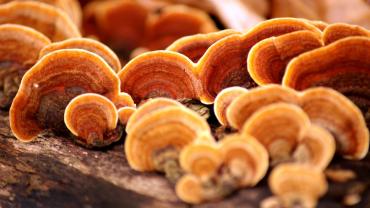
The oldest recorded medicinal use of mushrooms dates back to around the 1st century BC. Historical records throughout the centuries have shown that mushrooms are a subject of interest to support overall health. Mushrooms provide nutritional value (as a good source of selenium, potassium, riboflavin, niacin, and even vitamin D) and have also been shown to promote a balanced and healthy immune response.
Human and animal studies reveal that mushrooms contain polysaccharides or polysaccharide-protein complexes that can help promote innate and cell-mediated immune responses. The main polysaccharides in mushrooms are called β-glucans. While various forms of β-glucans are found in non-mushroom plants like rye, barley, millet, and oats — known to promote metabolic health by supporting healthy glucose and lipid metabolism — the β-glucans found in mushrooms differ.
Fungal β-glucans are characterized by β-1,3-glucans with short β-1,6-side chains and a triple helix conformation. This unique structure is recognized by receptors on the surface of immune cells, including macrophages, neutrophils, monocytes, natural killer (NK) cells, and dendritic cells, demonstrating fungal β-glucans immune-supportive properties.
β-glucans in mushrooms can stimulate the immune response by acting as a “training agent”, supporting increased immune responses when trained cells are exposed to a secondary stimulus, such as pathogens. As a result, fungal β-glucans may promote healthy immune responses when exposed to secondary fungal, bacterial, or viral infections. Owing to these properties, fungal β-glucans may promote healthy microbial environments, hold anti-inflammatory properties, and help protect the body from environmental toxins that could impair the immune system. Additionally, polysaccharide extracts from various edible mushrooms have shown the ability to promote antioxidant status by scavenging free radicals.
The β-glucan content of a mushroom depends on the species, environment, and maturity of the fruiting body, typically ranging between 3.1% to 46.5%. Various studies have investigated the immune-supportive properties of β-glucans in shiitake mushrooms (Lentinula edodes), maitake mushrooms (Grifola frondosa), reishi mushrooms (Ganoderma lucidum), and cordyceps mushrooms (Cordyceps sinensis), among others.
In an in vitro study, maitake and shiitake mushroom extracts significantly stimulated immune-defense reactions in both the cellular and humoral branches compared to a control. The maitake-shiitake extract combination was the most active, followed by maitake alone, then shiitake alone, and the control being last. Lentinan (a β-glucan from shiitake mushrooms) has been shown in vitro to modulate the immune system by selectively inducing inflammasome and cytokine expression and activating NK cells. Reishi has been shown to promote a Th1 immune response in vitro and in vivo by activating CD3+, CD4+, and CD8+ T cells.
Pre-clinical studies suggest cordyceps mushrooms help maintain a healthy and balanced immune response by influencing the production of various inflammatory cytokines, the phagocytosis of macrophages, and the production and release of nitric oxide (NO). Healthy adult men who received cordyceps (C. Militaris) supplementation (n = 39) displayed enhanced cell-mediated immunity compared to a placebo group (n = 40), with a statistically significant increase in NK cell activity, lymphocyte proliferation, interleukin-2, and interferon-γ status.
In addition to directly promoting healthy immune responses, β-glucans may also serve as prebiotics in the gut microbiome by being fermented by beneficial bacteria, such as Bifidobacterium and Lactobacillus. The β-glucan polysaccharides of cordyceps, maitake, and shiitake mushrooms have been demonstrated in various rodent models and in vitro studies to support a healthy gastrointestinal microbial environment and help with the production of short-chain fatty acids (SCFAs), both of which have beneficial effects in supporting a healthy immune system. For instance, healthy men and women (n = 52) who consumed either 5 g or 10 g of whole, dried shiitake mushrooms daily for four weeks exhibited improved immune responses (by enhanced cell proliferation and activation) and increased secretory immunoglobin-A (sIgA) production, which is primarily found in the gut.
Many of the immune health benefits of mushrooms have been studied thoroughly in vitro or animal studies. While further randomized, placebo-controlled clinical trials are needed to investigate the benefits of mushrooms in immune health, they hold promise in their ability to support a healthy and balanced immune response.
By Danielle Moyer Male, MS, CNS, LDN